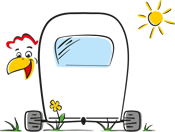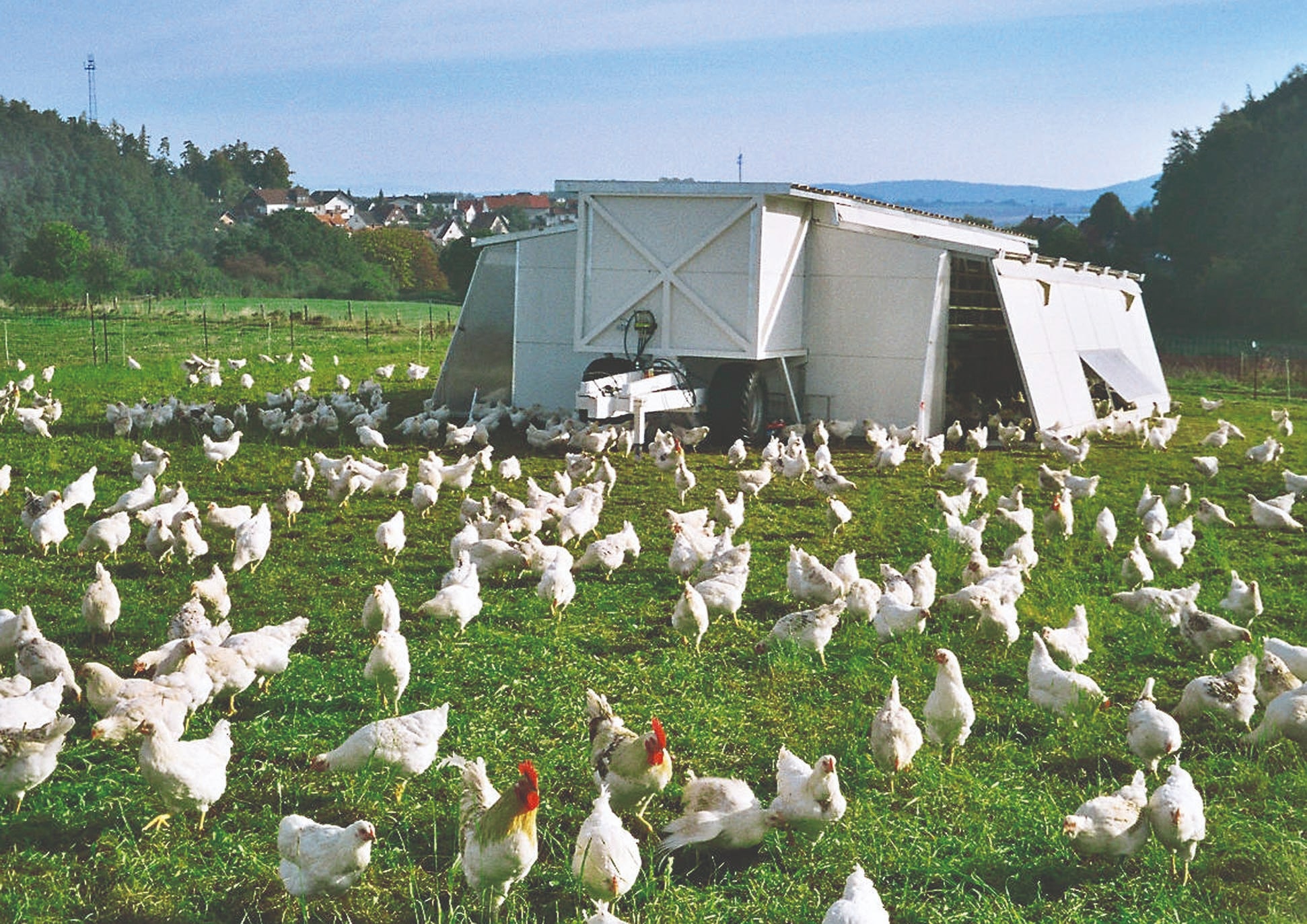We owe a lot to our chickens.
When, after our farming apprenticeship and studies in Witzenhausen, we, Iris and Max Weiland, wanted to put our Bioland farm on a stable footing at the beginning of the 90s, this was thanks in large part to our chickens.
Originally the idea was to grow fruit trees and herbs, and we had already secured purchase contracts for this produce. When this did not show the expected success, we set up a direct marketing business with a farm shop. The freshly laid eggs from our 300 hens in the conventional henhouse were sufficient to supply our regular and loyal customers. Every day and all year round the chickens had access to the run from morning till night. In the first few months they had already destroyed the intact green grass and left the ground bare. All that was left was what the chickens refused to eat. Intestinal parasites increased on the intensively used area, and our chickens were plagued by disease.
We nevertheless realised how important the green pasture and the sun were to the hens, and didn’t want to block their access to the chicken run for a time, which would have been normal procedure.
Why didn’t it work with the chickens like with the other animals on the farm? Our horses and sheep would roam far afield to find an attractive place to graze. Chickens do not do this, they seek shelter and need healthy grazing land close to the henhouse. If the chickens won’t move far, we concluded, then it would have be the coop – so we went in search of a mobile henhouse. In the mid-1990s we travelled around Germany and Switzerland looking for solutions, but nothing we found at that time had actually been moved around despite the mobile concept. There was nothing for it but to design our own, or find a company that could be inspired by the idea. Initially we had a company interested, but the henhouse needed to be suitable not only for flat terrain, but also for easy relocation on our North Hessian slopes. This was one requirement too much, and so we ended up building our own coop, and 16 more, in our barn from 2001 to 2009.
In 2010 Max Weiland, designer and driving force behind this idea, transferred the company to me in the hope that the vision of mobile chicken husbandry would spread further. Decisive for my decision to take over was a strong intuition, in conjunction with my Christian faith, that this idea of mobile husbandry had much greater potential than merely business success with a good product. This clearly beneficial form of chicken husbandry, with particularly high-quality eggs, could strengthen a large number of farms and support the rethinking already taking place in society towards focussing on the welfare of people, animals and the environment rather than maximising profits.
So that’s how the company history took its course. In 2010 Stallbau Iris Weiland e. K. (registered trader) was founded, trading from 2016 onwards as a GmbH und Co KG (limited partnership). Today, more than 1300 mobile henhouses not only transport chickens to intact pastures, but also, through the visible wellbeing of the livestock, reinforce a cooperation between farmers and consumers which is seldom to be found elsewhere. This mutual understanding between animals, humans, nature and living spaces provides for a strengthening of mixed farms, which, without polluting the environment with over-fertilisation and chemical agents, contribute to the preservation of insects, village culture, food security, educational experiences for our children and good work and income opportunities. This is demonstrated by the success stories from our more than 15 years of experience with the fully mobile Hühnermobil system (see brochure). Already in 2002 the first research project by the University of Kassel was started and confirmed the positive effects on animals and soils. In 2003 we received the Organic Farming Award, in 2012 the Innovation Prize Werra-Meißner and in 2013 the Innovation and Growth Award of the State of Hesse the category Innovation.
Initially the idea was treated with condescending smiles, today it is impossible to imagine life without its many benefits. In our experience, the welfare of animals, farmers and customers should be the first priority so that the positive effects, the good image and consumer trust are maintained. We are aware that with our decision in 2002, we set a process in motion that has not only influenced consumer perceptions, but also political awareness. Last but not least, the success of the idea has led other companies to follow in our footsteps.
We are continuing unerringly along this path, with livestock densities that are below the legally permissible levels, with behaviour-appropriate bedded nests wherever economically justifiable, with easy relocation of the henhouse, on wheels with continuous floor panel and completely self-sufficient in terms of electricity, water and feed supply.
Large installations with immobile coops, fixed piping systems and maximised stock densities with reduced working time based on a maximum of technology are not a part of our company philosophy.
There are still many ills to be addressed, which began with the industrialisation of agriculture and animal husbandry and have led to an unprecedented decline in family farms, such as the dependence of farms on just a few customers. The associated price pressure has unduly burdened farmers, animals, nature and the quality of our food. With the help of the already more than 30,000 egg customers every day, who with their purchase decision strengthen more than 700 versatile farms, we all show that reasonable egg prices are feasible. And to the many families who buy from the farmer next door, we offer not only very tasty eggs but much more, e.g. a visibly ethical form of food production.
We are grateful for this development and will continue to support you and strive daily to achieve further improvements with your help.
Iris Weiland, Weiland Vertrieb International GmbH
You are currently viewing a placeholder content from YouTube. To access the actual content, click the button below. Please note that doing so will share data with third-party providers.








